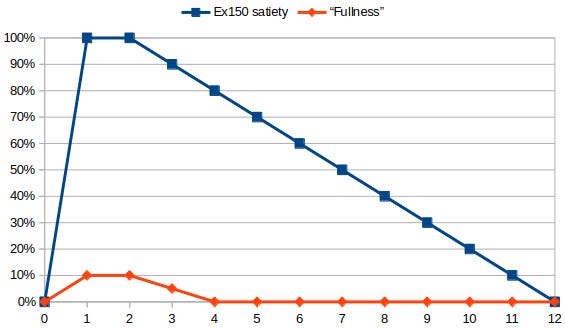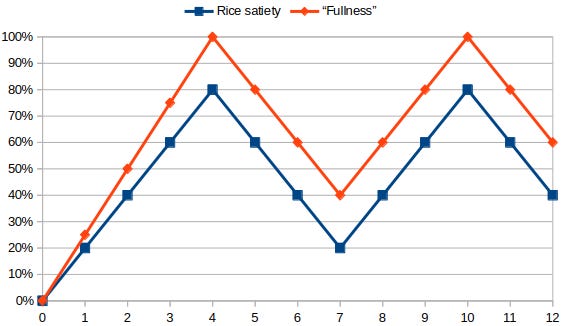Satiety Graphed & The Horsemen of Obesity
Graph me like one of your French creams
I have previously written about satiety, and how it is an elusive concept - ill defined at best, commonly undefined. The biggest proponents not only don’t have a definition, they’re actually proud of that fact.
Of course you cannot optimize or rely on something you can’t define, and if “satiety” is the cornerstone of your diet, you’re wrong, even if it works by accident once in a while.
On the other hand, I am certainly not against satiety: I like being satiated much more than being “full” (=physically bloated), and I think experiencing satiety is a sign of a healthy metabolism and healthy diet. I just think “I know it when I see it” is a useful operational definition or cornerstone of any diet.
But, if you’re metabolically healthy, you should experience “reasonable satiety” that doesn’t lead you to “overeating” although these are all undefinable in practice, which is why I put them in quotes.
My own heavy cream diet, ex150, infamously delivers what I call “cement-truck satiety” - it hits so hard, and so quickly, that it’s like getting hit by a truck.
I’ve timed myself and gone from first bite to “spoon is in front of my mouth, but I cannot put it in” in about 4 minutes.
On pure heavy cream, you can get so satiated that even looking at the fridge causes you to physically wince.
Currently, I’m doing a plain white rice trial and I’m 3/4 done, so I think I have some interesting insights on how satiety works on this. After being unable to get ANY amount of satiety for most of my life, up until I discovered ex150, it sure is a weird feeling to get satiated from carbs. But it’s definitely a thing.
Let’s dig in — as AI would say, heh.
Cement-truck Satiety
As I mentioned, it hits VERY quickly, very hard. I am unable to even think about eating food when I get real hard cement-truck satiety. An hour or two later I could probably eat if you made me, but I wouldn’t want to.
Overall I have pretty good satiety for many hours, and on this, I can actually go whole days without eating - as evidenced when I did 5 day fasts last year, and didn’t notice anything until the evening of the 5th day.
I’d say that it easily takes 8 hours until I really WANT to eat again. This is quite convenient, as you can just “fuel up” a couple times a day, and never be really hungry.
The satiety from heavy cream is also nearly entirely without volume, having no fiber at all - meaning you are never physically full. The satiety just hits you out of the blue.
Linear Satiety
Rice, on the other hand, has a very different sort of satiety. It feels a lot more linear, and it correlates quite a bit with physical fullness or bloat.
I can eat what feels like a substantial portion of rice (say 400g cooked), and barely get satiated from it. It’s not that filling yet, either, though certainly more than just about any amount of cream.
But then 400g of cooked rice only have about 600kcal. I’d need to eat this meal 4x a day just to get to 2,400kcal, or 5-5.5x to get to the 3,000-3,300kcal that would be expected for my lean mass.
You can eat more than 400g rice in one sitting, of course, and I often do on the rice diet. I can eat 2-3lbs of cooked rice easily before I get any real satiety, and by that point I’m somewhat bloated.
But 3lbs of rice are only about 1,600kcal, while it’s a gigantic amount of physical volume, and you’ll be eating for quite a while to get it all down, especially if you’re eating plain white rice like me - no sauces, no salt, no vegetables.
(I do supplement B1 to avoid Beri Beri, a vitamin deficiency.)
This means that getting rice satiety is sort of the opposite of cement-truck satiety - it is a very slow, and very deliberate thing, and you have to really keep grinding at it. You don’t just eat 3lbs of rice by accident.
Some might argue that this is actually a good thing - rice is so low in energy density and requires so much grinding to eat that you get better “satiety feedback” by giving your body enough time.
But in my experience, that’s not how it works at all. As I mentioned, my body can give me the strongest satiety signal I know (“cement-truck satiety”) in 4 minutes flat. Unless you’re chugging cream competitively, you will have no problem at all interpreting the satiety signal.
And if you whip your cream, like I do for dinner most evenings, you’re eating slow enough anyway.
The satiety from rice also doesn’t last as long.
In the same time that one big portion of cream produced 1 big hill on the satiety curve, even stuffing myself with 3lbs of rice has already lost its satiating effect and I’ve probably eaten again.
Even though the physical volume of food is much bigger on the rice diet, I have to eat more often, and I am hungrier more often, and never as satiated for as long.
Another downside is that the satiety wanes somewhat more quickly than the bloat/fullness - meaning I am sometimes still full, but hungry again.
I will say that the whole issue of uncomfortable bloat is very minimal this time around. It seems some of the adaptation to a high-starch diet (microbiome?) has stuck around. When I did a month of eating only rice the first time, it took me a week to even be able to digest 3lbs in one sitting, and it got better again about 3 weeks in.
This time, despite coming straight off a month of ex150 with minimal carbs or fiber, it felt like I started out with the week-3 adaptation from last time. I could right away eat huge amounts of rice, they were only moderately bloating, and the bloat went away much faster too.
So there’s definitely adaptation, and it’s not inconceivable that I would adapt even more to it if I were to eat a high-starch diet for 6 months straight, as opposed to switching back and forth between ex150 and plain rice diets.
That said, I’m quite happy that my adaptation seems to have stuck around for a couple months, as it seems a healthy person should be able to switch foods with the seasons, different locales, climates, and so on relatively easily.
Pathologies
Certain things seem to just remove the satiety "ceiling" entirely for me. In fact, I think it’s fair to say that I never experienced satiety from at least my teenage years until I discovered ex150 in my late 30s.
Before that, I took people who said they were “full” at face value. I was constantly full - but ravenous. Maybe the most extreme case was when my college roommate and I purchased candy and pastries for over $100, and ate it all in one sitting. I puked that night, but I was never “satiated” in any way. Full though.
Another time I went to an all-you-can-eat pizza restaurant. I don’t remember how many pizzas I ate, but it must’ve been closer to 10 than 5. After that, I lied down on my bed (on my back!) and suffered in pain from all the bloating in my stomach the entire night. I was so painfully full I couldn’t sleep.
I was never satiated on that pizza, but I was certainly full.
I think it’s fair to assume that a healthy human, eating a “species appropriate diet", should experience satiety in a way that roughly leads to eating the appropriate amount of energy substrates and building blocks, aka appropriate nutrition.
If you’re somehow eating 4,500kcal in one sitting and you’re not a giant strongman, or coming off a serious bout of food deprivation, something is probably off.
Satiety and appetite are the body’s regulatory systems for nutrition, and regulatory systems can break in many ways. Slime Mold Time Mold wrote an entire blog series about regulatory systems and how they can break.
Some simple examples: a thermostat is a regulatory system we all know. You can imagine multiple ways in which a thermostat could “break” or lead to a temperature in your house that you do not expect.
Somebody could’ve left a window open, and no matter how much the thermostat cranks the AC, more hot air keeps coming in.
On the other hand, somebody could’ve lit a fire under the temperature sensor, leading the thermostat to believe that it is much hotter than it actually is, and incorrectly trying to lower the temperature even further (via AC).
Of course, somebody could also have set your thermostat to an outrageous temperature. Or some other circuit in the control board is broken, so that even in absence of wrong set point, open windows, or misinformed sensors, the thermostat does the wrong thing.
Broken Arrow: Modern Human Satiety
We don’t know exactly how the body’s regulatory system for satiety & appetite works, but we can infer reasonable things just from watching it work.
Many modern humans, overweight and obese, seem to be getting completely messed up satiety & appetite signals.
Have you ever watched an obese guy eat 4,500kcal and then declare that he’s full, but starving? I was that guy most of my life.
Even many people who aren’t necessarily obese or even overweight have a broken satiety system, they’ve just been brainwashed into believing it’s normal.
If you can maintain a healthy body weight by restricting your total food intake, but never give in to eat ad libitum because you know you’d gain fat, your satiety & appetite are broken. Until very recently, nobody needed to count carolies to remain thin.
We all know that different foods have vastly different effects on satiety & appetite. While there are a handful of anecdotes of people losing weight on the “twinkie diet” this is an extreme outlier.
If I asked random people if they would expect to lose or gain fat on either of these diets, what do you think they would say?
A diet of fibrous vegetables, beans & other legumes, low in fat, with a base of starches like rice & potatoes (“Whole-Food, Plant-Based”)
A diet of doritos, twinkies, cake, buffalo wings, french fries, and hamburgers (“Ultra-Processed Food”)
Obviously, almost everyone would think the first diet would lead to “better satiety” and fat loss, whereas the second diet would “keep you hungry” and lead to fat gain.
False Flags
Diets like ex150 don’t really fit into the popular perception, because a 90% fat keto diet is such a weird hack that almost nobody in modern society knows how to place it. Maybe if you asked an Eskimo or an old school Plains Indian who grew up on pemmican and buffalo fat, those people would make an accurate guess.
Maybe more importantly, a lot of foods would probably be placed incorrectly. Did you stumble when you read “hamburger” in the above UPF diet?
Lots of people, especially nutrition experts, seem to categorize meat & beef in particular into the “bad” category of foods that are not satiating or that will make you “overeat” or gain fat.
I think that’s largely a historical coincidence. After the death of megafauna and humanity largely switching to agriculture for our nutrition, meat, especially fatty meat, became associated with wealth.
We then, somewhat recently in the last 100-150 years, became worried about health & obesity, and we saw that poor people who ate rice & beans seemed to be less overweight and less diabetic than rich people eating meat.
But I doubt it’s the meat making the rich people diabetic & obese.
And in America, at least, this has largely flipped: poor people aren’t eating rice & beans any more, they are eating the above-listed UPF junk-food diet. The meat in their hamburgers is just about the only piece of real nutrition they get.
On the other hand, rich people can afford fresh, whole foods, and they are likely more often vegetarian or even vegan. Healthy user bias therefore makes it look like “meat bad” and “Whole-Foods Plant-Based good,” when really the fresh beef would’ve been just as healthy as the rice & beans - that’s just not what we’re comparing.
That’s why you see the correlation run the other way in many countries, e.g. Hong Kong, where high meat correlates with health - rich, health-conscious people eat it.
The Modern Biochemical Horsemen of the Nutrition Apocalypse
What, then, are the things that wreck our regulatory system for appetite & satiety?
By the way, the “Horsemen” analogy for harmful food ingredients wasn’t my idea, I stole it from Kurt Harris, who blogged about nutrition over a decade ago. Great blog, then, sort of a more enlightened version of Paleo. I also think he didn’t get it exactly right, like most Paleo people. Unfortunately, his PaNu or Paleo Nutrition blog seems to no longer be online.
If I remember correctly, he cited the horsemen as something like this:
Refined sugar
Refined flour
Seed oils
He also had a few other ideas that still exist in parts, like gluten bad, staying away from legumes and certain other vegetables (anti-nutrients), possibly staying away from dairy if you don’t tolerate it. But I’d say none of those quite rose to “horseman” status. I could be wrong, since it’s been over a decade and the website is no longer online.
At the time I didn’t focus as much on the seed oil part, and I wasn’t cooking with soybean oil anyway, right?
Unfortunately, the linoleic acid in chicken & bacon message went over my head back then. While he did talk about it vs. ruminant fats, and he mentioned omega-3 and omega-6 like many other paleo gurus, I think paleo focused too much on refined grains and gluten, and possibly refined sugar.
If you look at metabolically healthy people not that long ago, e.g. our grandparents, they were able to reach pretty phenomenal satiety eating lots of refined grains.
You could argue that white rice is a refined grain, and not only did billions of Asian people stay lean & healthy on diets of 80%+ white rice, I am personally able to reach satiety on nothing but white rice RIGHT NOW. Even when drowning it in marinara sauce, as I did during my last rice experiment, I did experience satiety, although I didn’t lose any weight doing it.
I’m not sure I have a strong opinion on sugar yet, and how refined it needs to be. I did experience strong satiety on the sugar diet for a while, then didn’t. This also seemed to only work when I ate only sweet things, mixing starch (rice) and sugar seemed catastrophic, and I overate massively & rapidly gained fat.

Here’s my own, personal list:
Linoleic Acid. By far #1, and in my opinion a good candidate for being The One. The history of excess LA (via seed oils and then monogastric animal fats), epidemiology, and biochemical mechanics just line up better than anything.
Excess protein, for some people. This might only be in certain contexts (genetics? linoleic acid?), but some people lose all satiety signaling when they eat too much protein. I am among them. Restricting for these people leads to massive improvements in their satiety & appetite signaling, truly miraculous stuff.
Sugar, possibly refined sugar, possibly mostly when mixed in the same meal with other stuff like starches. Almost nobody ever eats pure granulated table sugar or even honey. Those that try it (e.g. my own ex150honey trial) report it being extremely unpleasant in absence of any other flavors. But adding sugar/honey/sweetness to other foods seems to make them “hyper-palatable,” allowing you to effortlessly “overeat” and gain fat.
The same might be true for anything else that makes food “more palatable”: tomato sauce, sour cream, salsa, sourness in general, maybe even vinegar, crunchiness, cheese. This could again be context-dependent: my grandparents seemed perfectly fine eating deli cheese slices on crunchy, toasted, buttered white bread, and the French seem fine on croissants. But maybe it doesn’t work as well if you grew up on a diet full of linoleic acid, or something else in our modern food environment.
Another weird one is eggs. Some people report extreme satiety from eggs, but I actually ate a carton of eggs PER MEAL when I did carnivore. Just like meat, eggs don’t seem to give me satiety per se, unless I previously established a satiety baseline by restricting protein long enough. In fact, adding eggs to anything will make it hyper-palatable, just like tomato sauce.
Think about it, what doesn’t taste better with eggs on it? Steak, potatoes, rice, bread, .. eggs are used as a topping & emulsifier in lots of cuisines, and there’s a good reason.Sleep deprivation. Less of an ingredient, of course, since nobody adds a sprinkle of sleep deprivation to their food. But lots of modern people are very sleep deprived much of the time, and personally my satiety switch is just entirely set to “OFF” when I’m severely sleep deprived.
I also don’t exactly have increased appetite or cravings. But if I’m in a metabolic state that is already broken, as I was for most of my life, then being sleep deprived & completely unable to feel any satiety is even worse.
The best counter, in my experience, is to just go by “known-good” numbers from memory when sleep deprived. If you know what you’d usually eat in a good day with working satiety & without being sleep deprived, just try to eat what you’d eat on such a day. Realize your satiety signal might not be working well during your sleep deprived state.
Fasting might be attractive for those situations, but only if you’re normally good at fasting and don’t get cravings from it (e.g. me on ex150). Otherwise it could backfire, as it did for me on the rice diet recently (lol) and lead to cheating if you outfast your metabolic runway.
As you can see, beyond linoleic acid, most of these aren’t necessarily applicable for all people or all contexts.
You know yourself best: if steak & eggs is very satiating for you and you lost tons of fat eating it, great! No need to change it.
Are you one of the few people who experience great satiety & fat loss on the honey or sugar diets? By any means, keep on doing it.
But I’m pretty sure nobody will profit, in terms of satiety or long term fat loss or long term health, by consuming & storing excess linoleic acid.
Hence, as usual, my recommendation is to avoid excess linoleic strictly for the rest of your life, and to play around with restricting the other factors if you haven’t yet completely dialed in your health and body composition. Maybe some of them work great for you, while others are your absolute kryptonite.
At this point, nobody knows, and you’ll just have to find out for yourself.





This is a key element of the whole weigh loss debacle. The lack of definition here is troubling and confuse both those who easily feel satiated and those who never feel it in the first place. They're all speaking a different language.
Your distinctions are useful!
Enough sleep is a master switch for satiety for me. And the easiest way for me to not get enough sleep is to not eat to satiety. I seem to do this often, which has me wake an hour or three early.